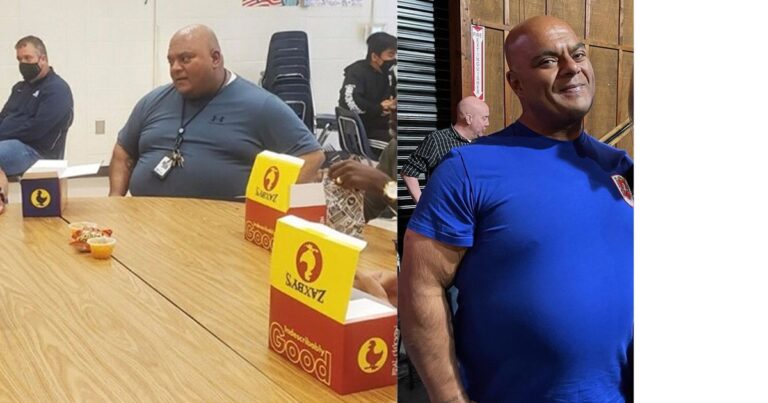
Total pounds lost: 265 pounds
Height: 6 feet
Personal life: “I live in Atlanta and work in Marietta. I’m a high school alternative education school teacher with Marietta City Schools,” Ahmad said. “Before that, I was a police officer for a while.”
The lifestyle change: “I found out I had sleep apnea, and they gave me a BiPAP machine. It was a game changer. All of a sudden I had energy and felt rested in the morning. I was getting real sleep,” Ahmad said. “… Being overweight really exacerbated sleep apnea. I kind of did a bunch of things at the same time. The dietitian was a big deal. I went to a real dietitian, a registered dietitian who works in a hospital, someone who went to school for it — the diet specialist at the gym doesn’t know what he’s talking about. I went and saw a real dietitian that my health insurance paid for. … He talked me away from fad diets and pointed me away from a cheat day. It’s counterproductive to what you’re trying to do. … I ate myself to 550 pounds. I had a very unhealthy relationship with food. I had to treat food like I was an alcoholic — I just cut things out cold turkey just to make myself right.”
Change in eating habits: “I changed everything,” Ahmad said. “I was eating bags of M&Ms, three burgers, a pound of french fries and a bag of kettle chips. I changed everything.” He stopped eating desserts and began eating raw vegetables and lean meats.
Exercise routine: “I have a lot of injuries,” Ahmad said. “I used to play football in college. I was a professional fighter. I went searching in Atlanta for gyms that had professional trainers. At the Refinery (https://refineryfit.com/), everyone there is (highly certified). I get lots of one-on-one attention.” He works out six to seven days per week.
Farhat’s steps to change:
1. The BiPap: “First was getting help for my sleep apnea with the BiPAP machine.”
2. The nutritionist: Going to a registered dietitian nutritionist (RDN) who has a degree and is trained in the science of nutrition made a difference, Ahmad said.
3. The coach: “Finding the right coach and then listening to what they have to say.”
Biggest challenge: “Adjusting to the new body. Not having that emotional crutch of overeating and comfort eating,” Ahmad said. “Like it or not, those old habits were comfortable.”
The struggle: “Just wanting food, being around food, getting invited to places serving food, friends inviting me out to eat — this whole culture of going out and eating,” Ahmad said.
Facing the challenges: “Living a life of discipline is the best way I have to say it,” Ahmad said.
Top tips:
1. See a doctor: “You’ve got to see a doctor.”
2. Talk to a registered dietitian “One with a degree who has studied the science.”
3. Find a gym “One that has a supportive community and good coaches and trainers.”
How his life has changed: “I don’t have asthma anymore. I don’t have high blood pressure anymore. I’m off my high blood pressure meds. I sleep a lot better,” Ahmad said. “… The attention can be good and bad. It’s bad because sometimes people will stop you in the middle of a workout and everyone looks for a magic pill. Everyone thinks it’s something that just happened. No, man, I busted my (butt) to get here — it was one of the hardest things I’ve ever done.”
Seeking readers’ stories of lifestyle changes: We’re looking for stories about changing health habits. While The Atlanta Journal-Constitution does not endorse any specific programs, we include names and links for the benefit of readers who want further information. If you would like to share your story of a lifestyle change, please contact reporter Michelle C. Brooks and include your email address, phone number, and before and after photos (by mail or JPEG). You can email her directly at: [email protected].